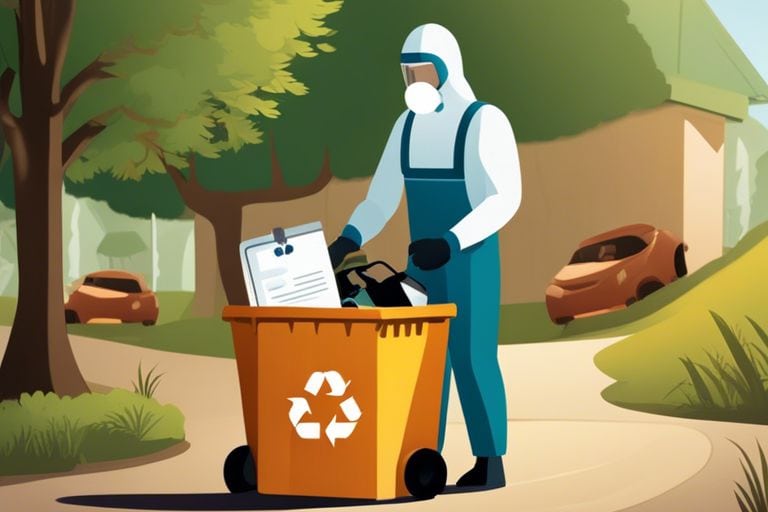This comprehensive guide will walk you through the crucial steps of handling used oil responsibly. Extended Producer Responsibility (EPR) annual filing plays a crucial role in ensuring that businesses properly manage and dispose of used oil, preventing environmental harm. Understanding the intricacies of EPR annual filing is vital for staying compliant and minimizing the impact of hazardous waste on the environment. Let's probe into the details of how to navigate this process effectively.
Key Takeaways:
- Proper handling: It is crucial to handle used oil responsibly, from collection to disposal, to prevent harm to the environment and public health.
- EPR Annual Filing: Understanding Extended Producer Responsibility (EPR) requirements and completing annual filings is crucial for organizations managing used oil.
- Compliance: Adhering to regulations and guidelines set by environmental authorities ensures that used oil is managed in a sustainable and responsible manner.
Understanding Used Oil
Even EPR For Used Oil | Benefits | Documents | Process, it is vital to understand the nature of used oil and why it is crucial to handle it responsibly. Used oil is any petroleum-based or synthetic oil that has been used for its original purpose and as a result of such use is contaminated by physical or chemical impurities.
Types of Used Oil
There are different types of used oil that are commonly found, including motor oil, hydraulic oil, transmission fluid, gear oil, and cutting fluids. Each type of used oil comes with its own set of challenges in terms of disposal and recycling. It is important to correctly identify the type of used oil to ensure proper handling and treatment.
| Type of Used Oil | Description |
|---|---|
| Motor Oil | Used in engines for lubrication |
| Hydraulic Oil | Used in hydraulic systems for power transmission |
| Transmission Fluid | Used in automatic transmissions for lubrication |
| Gear Oil | Used in gear systems for lubrication |
| Cutting Fluids | Used in metalworking processes for cooling and lubrication |
Though proper handling and disposal of used oil are crucial for environmental protection and human health,
Factors Affecting Used Oil Quality
With factors affecting used oil quality, it is vital to consider the age of the oil, contamination levels, exposure to heat and oxygen, and mixing with other substances. These factors can significantly impact the quality of used oil and determine its suitability for recycling or disposal.
- Age of the oil: Determines degradation levels
- Contamination levels: Influence recycling possibilities
- Exposure to heat and oxygen: Accelerates degradation
- Mixing with other substances: Alters chemical composition
Knowing the factors affecting used oil quality is crucial for making informed decisions regarding proper handling and disposal methods. By understanding these factors, you can effectively manage used oil to minimize environmental impact and promote sustainable practices.
Tips for Safe Handling of Used Oil
Little care and attention can go a long way when it comes to handling used oil. Follow these tips to ensure that you are handling used oil responsibly:
- Avoid mixing used oil with other substances
- Store used oil in leak-proof containers
- Label containers clearly as "Used Oil"
- Dispose of used oil at designated collection centers
- Use eco-friendly disposal options whenever possible
Assume that all used oil is hazardous and handle it with caution to protect yourself and the environment. For more detailed guidelines on HOW TO IMPLEMENT EXTENDED PRODUCER RESPONSIBILITY (EPR), refer to the resource by WWF.
Preparing for Oil Changes
Used oil changes are routine maintenance tasks for vehicles and machinery. Before starting the process, gather all necessary tools and equipment, such as a drain pan, wrenches, and funnels. Ensure that the oil is at a safe temperature for handling to prevent burns.
Remember to wear protective gear, such as gloves and goggles, to avoid skin contact and eye irritation. Place a protective layer under the vehicle to catch any spills or drips during the oil change to prevent contamination of the ground.
Storage and Contamination Prevention
One of the crucial aspects of responsible used oil management is proper storage and contamination prevention. Keep used oil containers tightly sealed to prevent leaks and contamination of the surrounding area.
Contamination of soil and water sources can have detrimental effects on the environment and wildlife. Be proactive in preventing spills and leaks by regularly inspecting storage containers for any signs of damage or deterioration.
Step-by-Step: EPR Annual Filing Procedure
Now that you have collected and recycled used oil responsibly, it's time to complete your Extended Producer Responsibility (EPR) annual filing. This procedure ensures that you are compliant with regulations and have properly documented your oil collection and recycling efforts.
| Step 1 | Create a detailed report outlining the amount of used oil collected, the methods of recycling used, and the environmental impact of your recycling efforts. |
| Step 2 | Gather all relevant receipts, invoices, and documentation to support your report. Ensure that these documents are organized and easily accessible. |
| Step 3 | Complete the EPR annual filing form provided by the regulatory authorities. Submit this form along with your detailed report and supporting documents. |
Documenting Oil Collection and Recycling
An important part of the EPR annual filing procedure is documenting your oil collection and recycling activities. Keep detailed records of the amount of used oil collected, the methods used for recycling, and the environmental benefits of your recycling efforts. Make sure to include receipts and invoices as supporting documentation for your report.
By documenting your oil collection and recycling process, you demonstrate transparency in your operations and show your commitment to environmental stewardship. This information is crucial for regulatory compliance and helps build trust with stakeholders and the community.
Navigating Regulatory Requirements
Regulatory requirements can be complex and can vary depending on your location and the type of used oil being recycled. It is important to have a clear understanding of the regulations governing used oil recycling in your area to ensure compliance. Failure to comply with these regulations can result in fines and penalties.
To navigate regulatory requirements successfully, consider working with a compliance expert or consultant who specializes in EPR and used oil recycling. They can provide valuable guidance and ensure that your EPR annual filing is accurate and meets all regulatory standards.
Advantages and Disadvantages of EPR Programs
Many companies are increasingly turning to Extended Producer Responsibility (EPR) programs to manage used oil responsibly. These programs, which are part of broader efforts to promote sustainability and environmental protection, shift the responsibility for proper disposal and recycling of used oil from consumers to product manufacturers. For a comprehensive understanding of EPR programs and sustainable packaging legislation, check out this Guide to EPR and Sustainable Packaging Legislation.
Pros of EPR for Oil Management
1. Environmental Benefits: EPR programs encourage manufacturers to design products with end-of-life considerations in mind, leading to increased recycling rates and reduced environmental impact from used oil disposal.
2. Shared Responsibility: By holding producers responsible for managing the disposal of their products, EPR programs promote a sense of shared responsibility among all stakeholders, leading to more sustainable oil management practices.
Cons and Challenges of EPR Implementation
Disadvantages of EPR programs include certain challenges that companies may face. Some manufacturers may perceive the financial burden of compliance as a disadvantage, as implementing EPR practices can require initial investments in infrastructure and processes. Additionally, navigating the complex regulatory landscape and ensuring compliance with varying EPR requirements across different regions can pose challenges for multinational corporations.
Advantages
Plus, EPR programs provide an effective mechanism for holding producers accountable for the entire lifecycle of their products, from production to disposal, fostering a culture of sustainability and environmental stewardship in the industry.

Final Words
Considering all points discussed in 'The Complete Guide To Handling Used Oil Responsibly - EPR Annual Filing Explained,' it is evident that proper management of used oil is crucial to minimize environmental impact and ensure compliance with regulations. By understanding the Extended Producer Responsibility (EPR) program and following the annual filing requirements, businesses can effectively contribute to a sustainable and responsible approach to used oil disposal. It is vital for all stakeholders to prioritize the safe handling of used oil to protect our environment and public health for generations to come.
FAQ
Q: Why is it important to handle used oil responsibly?
A: Properly handling used oil is crucial because it can contain harmful contaminants that can pollute the environment if not disposed of correctly. By managing used oil responsibly, we can protect our ecosystems and prevent water and soil contamination.
Q: What is EPR Annual Filing?
A: EPR Annual Filing refers to the process of submitting a report to Extended Producer Responsibility (EPR) programs detailing the amount of used oil collected, processed, and recycled over the course of a year. This filing helps monitor compliance with regulations and ensures that proper recycling and disposal practices are followed.
Q: Who is required to file EPR Annual Reports for used oil?
A: In most cases, businesses or organizations that generate, handle, or collect used oil are required to file EPR Annual Reports. This includes oil producers, distributors, service garages, and other entities involved in the management of used oil.
Q: What information is typically included in an EPR Annual Filing for used oil?
A: EPR Annual Filings for used oil usually include details such as the total amount of used oil collected, processed, and recycled, as well as the methods used for recycling or disposal. Information on any challenges faced during the reporting period and efforts to improve recycling practices may also be required.
Q: How can I ensure compliance with EPR Annual Filing requirements for used oil?
A: To ensure compliance with EPR Annual Filing requirements for used oil, businesses should keep accurate records of their used oil collection, processing, and recycling activities throughout the year. It is also important to stay informed about relevant regulations and guidelines to avoid any non-compliance issues.
